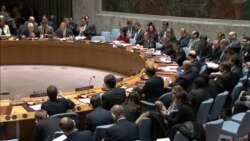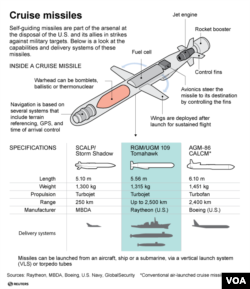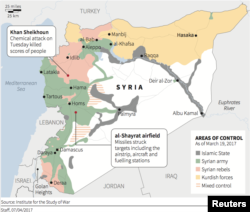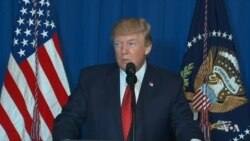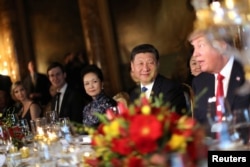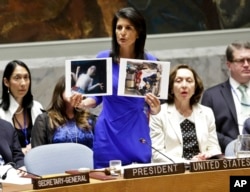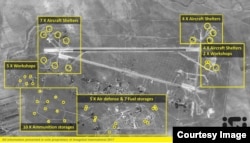ການໂຈມຕີດ້ວຍລູກສອນໄຟຂອງສະຫະລັດ ຕໍ່ຊີເຣຍ ເພື່ອຕອບໂຕ້ຕໍ່ການໃຊ້ອາວຸດ
ເຄມີໂຈມຕີ ທີ່ໄດ້ສັງຫານພົນລະເຮືອນປະມານ 100 ຄົນນັ້ນ ພວມຂົ່ມຂູ່ ຕໍ່ຄວາມສຳ
ພັນລະຫວ່າງສະຫະລັດ ກັບຣັດເຊຍ ຊຶ່ງເປັນພັນທະມິດທີ່ແຂງຂັນຂອງລັດຖະບານຊີ
ເຣຍທີ່ມີການຖິ້ມໂທດໃສ່ວ່າເປັນຜູ້ຮັບຜິດຊອບຕໍ່ການໂຈມຕີດ້ວຍແກັສພິດນັ້ນ.
ປະທານາທິບໍດີຣັດເຊຍ ທ່ານ Vladimir Putin ກ່າວໃນເຊົ້າວັນສຸກວານນີ້ວ່າ “ການ
ໂຈມຕີນີ້ຈະສ້າງຄວາມເສຍຫາຍຮ້າຍແຮງ ໃຫ້ແກ່ສາຍພົວພັນ ລະຫວ່າງ ສະຫະລັດ
ກັບຣັດເຊຍ” ແລະຍັງ “ລະເມີດຕໍ່ກົດໝາຍນາໆຊາດ” ອີກດ້ວຍ ອີງຕາມຖະແຫຼງການ
ທີ່ນຳອອກເຜີຍແຜ່ໂດຍວັງເຄຣັມລິນ.
ເພື່ອເປັນການຕອບໂຕ້ຕໍ່ການໂຈມຕີດັ່ງກ່າວນີ້ ຣັດເຊຍເວົ້າວ່າ ຕົນໄດ້ໂຈະຂໍ້ຕົກລົງ
ເພື່ອຫຼີກລ່ຽງບໍ່ໃຫ້ເກີດບັນຫາຂັດແຍ້ງໂດຍຄວາມບັງເອີນລະຫວ່າງເຮືອບິນທະຫານ
ຂອງສະຫະລັດແລະຣັດເຊຍທີ່ບິນປະຕິບັດງານຢູ່ໃນເຂດນ່ານຟ້າຂອງຊີເຣຍ.
ເອກອັກຄະລັດຖະທູດສະຫະລັດ ປະຈຳອົງການສະຫະປະຊາຊາດ ທ່ານນາງ Nikki
Haley ກ່າວທີ່ກອງປະຊຸມສຸກເສີນ ຂອງສະພາຄວາມໝັ້ນຄົງ ອົງການສະຫະປະຊາ
ຊາດໃນວັນສຸກວານນີ້ວ່າປະທານາທິບໍດີຊີເຣຍທ່ານ Bashar al-Assad ອາດຖືວ່າ
ຣັດເຊຍໂງ່ໂດຍປິດບັງເລື່ອງອາວຸດເຄມີບໍ່ໃຫ້ຣັດເຊຍຮູ້ນັ້ນແມ່ນຄຳອະທິບາຍທີ່ອາດ
ເປັນໄປໄດ້ ທີ່ຣັດເຊຍ ໄດ້ໃຫ້ການສະໜັບສະໜຸນ ທາງທະຫານ ຕໍ່ອຳນາດ ການປົກ
ຄອງຊີເຣຍ ແບບບໍ່ມີການປ່ຽນແປງ.
ກອງທັບສະຫະລັດ ໄດ້ຍິງລູກສອນໄຟ ຈຳນວນນຶ່ງ ເຂົ້າໄປໃນຊີເຣຍ ຊຶ່ງເປັນການ
ໂຈມຕີໂດຍກົງເທື່ອທຳອິດຕໍ່ກຳລັງລັດຖະບານຊີເຣຍ.
ສະຫະລັດເລີ່ມຍິງໂຈມຕີດ້ວຍລູກສອນໄຟ Tomahawk ຈຳນວນ 59 ລູກ ທີ່ນຳທິດ
ທາງໂດຍດາວທຽມໃນເວລາປະມານ 4 ໂມງ 40 ຕອນເຊົ້າຕາມເວລາທ້ອງຖິ່ນໃນຊີ
ເຣຍ ຈາກກຳປັ່ນລົບ Rossand ແລະ Porter ທີ່ໄດ້ສົ່ງໄປປະຈຳການ ຢູ່ທີ່ພາກຕາ
ເວັນອອກຂອງທະເລ Mediterranean. ການຍິງລູກສອນໄຟນີ້ ໄດ້ໃຊ້ເວລາຢູ່ສາມ
ຫາສີ່ນາທີ ອີງຕາມຄຳເວົ້າຂອງເຈົ້າໜ້າທີ່ສະຫະລັດ.
ທຳນຽບຂອງປະທານາທິບໍດີຊີເຣຍ ກ່າວເຖິງການໂຈມຕີໃນຄັ້ງນີ້ ຢູ່ໃນຖະແຫຼງການ
ສະບັບນຶ່ງວ່າ ໄຮ້ຄວາມຄຶດແລະຂາດຄວາມຮັບຜິດຊອບ. ຖະແຫຼງການຍັງກ່າວຕື່ມ
ວ່າ ການໂຈມຕີນີ້ແມ່ນສາຍຕາສັ້ນ ແລະເປັນການສືບຕໍ່ໃນນະໂຍບາຍ ທີ່ບັງຄັບໃຫ້
ຜູ້ຄົນເຊື່ອຟັງ ຂອງສະຫະລັດ.
ກ່າວກັນວ່າກຳລັງສະຫະລັດ ໄດ້ແນເປົ້າໝາຍໃສ່ສະໜາມບິນ Shayrat ຢູ່ໃນພາກ
ຕາເວັນຕົກຂອງຊີເຣຍ. ເຈົ້າໜ້າທີ່ ກອງທັບເຮືອ ຂອງສະຫະລັດ ກ່າວຕໍ່ວີໂອເອ ວ່າ ສະໜາມບິນນີ້ ເປັນເປົ້າໝາຍເພາະວ່າ ເປັນບ່ອນທີ່ມີຄວາມເປັນໄປໄດ້ສູງ ໃນການ
ໃຊ້ໂຈມຕີ ດ້ວຍອາວຸດເຄມີ ຕໍ່ເມືອງທີ່ໝັ້ນ ຂອງພວກຕໍ່ຕ້ານລັດຖະບານ ໃນວັນອັງ
ຄານມາທີ່ຜ່ານມາ.
The U.S. missile strike against Syria in retaliation for a chemical weapons attack that killed about 100 civilians is threatening relations between the U.S. and Russia, a staunch ally of the Syrian government.
Russian President Vladimir Putin said early Friday that the attack would "inflict major damage on U.S.-Russia ties" and was in "violation of international law," according to a Kremlin statement.
In response to the U.S. attack, Russia said it was suspending an agreement aimed at avoiding accidental conflicts between U.S. and Russian military aircraft operating in Syrian airspace. Senior U.S. military officials, however, said Friday that the hotline with Russia remains open.
The U.S. ambassador to the United Nations, Nikki Haley, said at an emergency U.N. meeting Friday that Syrian President Bashar al-Assad could be "playing Russia for fools" by concealing chemical weapons from Moscow, a possible explanation for Russia's unwavering military support for the Syrian regime.
The U.S. military fired a barrage of missiles into Syria, the first direct U.S. assault on Syrian government forces.
The 59 Tomahawk cruise missiles were launched about 4:40 a.m. local time from the U.S. Navy destroyers USS Ross and USS Porter, which are deployed in the eastern Mediterranean. The missile launch lasted for three to four minutes, U.S. officials said.
The office of the Syrian president described the strikes in a statement as "reckless" and "irresponsible." The statement added that the attacks were "shortsighted" and a continuation of a U.S. policy of "subjugating people."
U.S. forces were said to have targeted Shayrat Airfield in western Syria. A Navy official told VOA the airfield was targeted because it was most likely used to launch Tuesday's chemical strikes on a rebel-held town.
Sarin nerve gas
“We have a very high level of confidence that the attacks were carried out under aircraft under the direction of Bashar al-Assad’s regime. We have very high confidence that the attacks involved the use of sarin nerve gas,” U.S. Secretary of State Rex Tillerson told reporters late Thursday.
Tillerson said it was important to take action against the Syrian leader, because “as Assad has continued to use chemical weapons in these attacks with no response, with no response from the international community, he, in effect, is normalizing the use of chemical weapons, which may then be adopted by others.”
Action needed to be taken, he added, “to make clear that these chemical weapons continue to be a violation of international norms.”
National security adviser H.R. McMaster said the strikes avoided depots located on the airbase where U.S. officials thought sarin was being stored.
"Obviously, the regime will retain a capacity to commit mass murder with chemical weapons beyond this airfield," McMaster said. But, he added, "this was not a small strike."
Pentagon spokesman Captain Jeff Davis said the targets included aircraft, structures, petroleum and logistical storage, and ammunition supply bunkers.
Davis said military planners "took precautions" to limit risks to Russian and Syrian personnel at the airfield. Syria's military, however, said Friday morning that six people had been killed and several others wounded.
"Initial indications are that this strike has severely damaged or destroyed Syrian aircraft and support infrastructure and equipment at Shayrat Airfield, reducing the Syrian government's ability to deliver chemical weapons," Davis said in a statement. Davis added that the Russian government had been given advance warning of the missile attack.
Tillerson added, “We feel that the strike itself was proportional because it was targeted at the facility that delivered this most recent chemical weapons attack.”
U.S. President Donald Trump addressed the nation Thursday night.
Watch: President Trump's Statement on US Missile Strikes on Syria
U.S. President Donald Trump addressed the Nation Thursday night.
"On Tuesday, Syrian President Bashar al-Assad launched a horrible chemical attack on innocent civilians using a deadly nerve agent. ... Tonight I ordered a targeted military strike on the airfield in Syria from where the chemical attack was launched," Trump said.
"It is in this vital national security interest of the Untied States to prevent and deter the spread and use of deadly chemical weapons."
Trump called on all civilized nations to join the U.S. "in seeking an end to the slaughter and bloodshed in Syria."
Reaction
Syrian state TV called the U.S. strike an act of "aggression." While a Turkish-based Syrian opposition group, the Syrian Coalition, welcomed the U.S. attack, saying that it had put an end to an age of "impunity" and that the military action should continue.
Syria ally Iran also condemned the U.S. military action.
Leaders from countries allied with the U.S. — Germany, France, Israel, Saudi Arabia and Turkey, along with several others — voiced support for the early-morning strike.
Chinese leader’s visit
The airstrike came as Trump entertained Chinese President Xi Jinping at the president's Mar-a-Lago retreat in Florida.
Trump did not announce the attacks in advance, although he and other national security officials ratcheted up their warnings to the Syrian government throughout the day Thursday.
"I would tell you that the response from our allies, as well as the region and the Middle East, has been overwhelmingly supportive of the action we taken," Tillerson said. He is scheduled to travel to Russia next week.
Surprise action
The surprise action marked a striking reversal for Trump, who warned as a candidate against the U.S. getting pulled into the Syrian civil war, now in its seventh year. But the president appeared moved by the video and photos of children killed in the chemical attack, calling it a "disgrace to humanity" that crossed "a lot of lines."
Just last week, the White House backed away from the former Obama administration's stance that Assad must be removed from power.
While Trump did not say whether he now thought, in the wake of the gas attack, Assad should be driven from power, Tillerson said earlier Thursday that Assad had to go and that there was "no role for him to govern the Syrian people" in the future.
Syria's civil was had killed hundreds of thousands of people and displaced millions, contributing to the largest refugee crisis since the end of World War II.
UN discussions
At the emergency U.N. meeting Friday, Haley said the U.S. attacks were "fully justified" and warned that the U.S. was "prepared to do more, but we hope that will not be necessary."
After U.N. diplomats met Thursday to discuss draft resolutions responding to the gas attack, Russia's deputy U.N. ambassador, Vladimir Safronov, said "negative consequences" must be considered if the U.S. were to take unilateral military action.
Discussions ran late into the evening Thursday, but no consensus was agreed to.
Denies allegations
Syrian Foreign Minister Walid Moallem said his country did not use chemical weapons during airstrikes on Khan Sheikhoun. He insisted they would never be used, "even against terrorists."
But Dr. Annie Sparrow, a public health specialist and a critical-care pediatrician at Mount Sinai Hospital in New York who has carried out many studies on Syria, told VOA Turkish service that a "chemical cocktail" was used on the town.
VOA's Jamie Dettmer, Mehmet Sumer and Wayne Lee contributed to this report.





